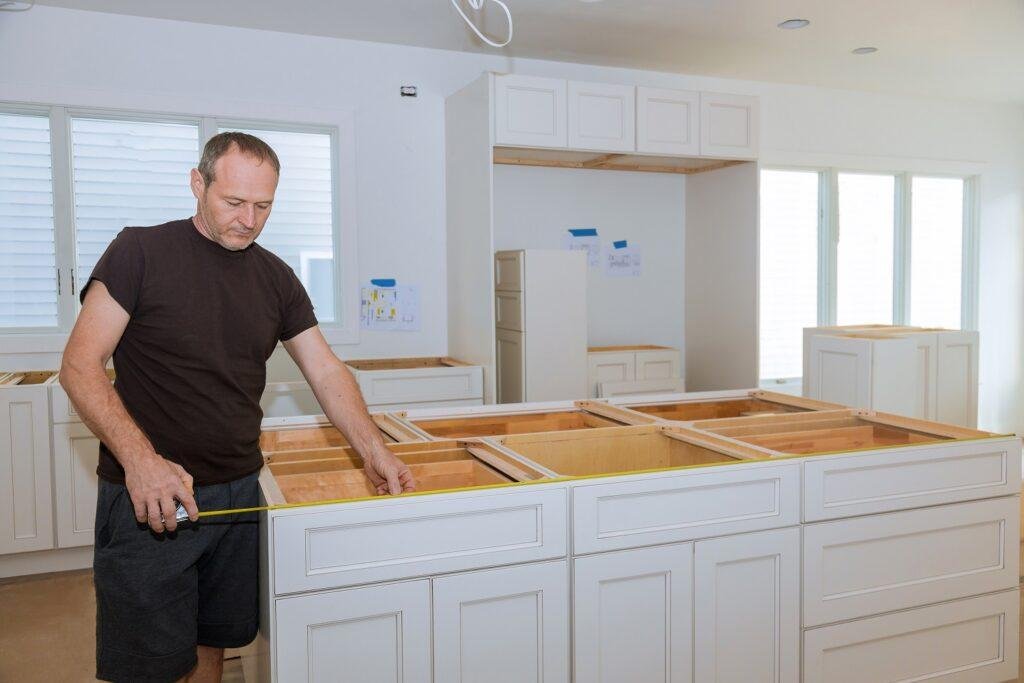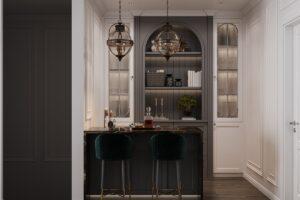
What is a modular kitchen?
A modular kitchen is a pre-fabricated kitchen made up of standardized components that can be easily assembled and disassembled. It typically includes base units, wall units, countertops, and appliances, all designed to fit together seamlessly. The modular nature of these kitchens allows for easy customization and flexibility in terms of layout and design.
Benefits of having a modular kitchen
Modular kitchens offer several advantages over traditional kitchens. Firstly, they are highly functional, making the best use of available space and providing efficient storage solutions. Secondly, they are easy to clean and maintain, thanks to their smooth surfaces and removable components. Additionally, modular kitchens are known for their durability and long-lasting quality, ensuring that your investment will stand the test of time.
Designing Your Dream Kitchen
Understanding your requirements
Before designing a modular kitchen, it’s essential to understand your specific needs and preferences. Consider factors such as the size of your family, cooking habits, storage requirements, and any special appliances or features you desire. This initial step will help you create a kitchen that perfectly suits your lifestyle.
Customizing your modular kitchen
One of the greatest advantages of a modular kitchen is its ability to be customized. You can choose from a wide range of layouts, materials, colors, and finishes to create a kitchen that reflects your personal style. Collaborating with a professional kitchen designer can help you make informed decisions and optimize the functionality of your kitchen.
Choosing the right materials
When selecting materials for your modular kitchen, it’s crucial to prioritize durability, hygiene, and aesthetic appeal. Common options include high-quality wood, laminate, stainless steel, and granite for countertops. Each material has its own advantages, so it’s important to consider factors such as maintenance requirements and budget.
Optimizing space utilization
Efficient space utilization is a key aspect of modular kitchen design. Utilize corner units, pull-out shelves, and racks to maximize storage capacity. Incorporate wall units to free up counter space and keep frequently used items within reach. Careful planning and layout optimization can help you make the most of even the smallest kitchen areas.
Advantages of Modular Kitchens
Enhanced functionality and convenience
Modular kitchens are designed to enhance functionality and make cooking more convenient. The layout and placement of various components are optimized to ensure smooth workflow and minimize effort during meal preparation. Everything from the positioning of appliances to the arrangement of storage units is carefully planned to provide a seamless cooking experience.
Efficient storage solutions
One of the standout features of a modular kitchen is its efficient storage solutions. Cabinets, drawers, and pull-out units allow for easy organization of utensils, cookware, and groceries. With designated spaces for different items, you can find what you need quickly and keep your kitchen clutter-free.
Easy maintenance and cleaning
Modular kitchens are designed with cleanliness in mind. The smooth surfaces of cabinets, countertops, and appliances make them easy to wipe down and maintain. Additionally, the modular nature of these kitchens allows for the removal and cleaning of individual components, ensuring that every nook and cranny is spotless.
Durability and long-lasting quality
Investing in a modular kitchen ensures long-term durability. High-quality materials and expert craftsmanship result in a kitchen that can withstand daily wear and tear. The sturdiness of modular kitchens means that they can endure the test of time, providing you with a reliable cooking space for years to come.
Transforming Your Cooking Space
Modular kitchen layouts
There are several popular modular kitchen layouts to choose from, each with its own advantages. The L-shaped kitchen layout is ideal for maximizing corner spaces and providing ample countertop area. The U-shaped kitchen layout offers an efficient workspace and allows for easy movement between different cooking stations. For larger kitchens or open-plan spaces, an island kitchen layout provides additional storage and a designated space for socializing.
Innovative storage solutions
Modular kitchens offer a wide range of innovative storage solutions to keep your kitchen organized and efficient. Cabinets and drawers with smart inserts and dividers ensure that each item has its place. Pull-out shelves and racks maximize accessibility, making it easier to reach items stored at the back. Corner units utilize previously unused space, providing extra storage for bulky items.
Countertops and workstations
The choice of countertops and workstations can greatly impact the functionality and aesthetics of your modular kitchen. Materials like granite, quartz, or marble offer durability and a luxurious look. Consider the amount of workspace you require for meal preparation, and ensure that your chosen countertop material is resistant to stains, heat, and scratches.
Stylish and functional appliances
Selecting the right appliances is essential for a fully functional modular kitchen. Look for energy-efficient options that suit your cooking needs and preferences. Incorporate appliances such as built-in ovens, microwaves, dishwashers, and refrigerators to streamline your kitchen workflow and create a modern, seamless appearance.
Incorporating Style and Aesthetics
Choosing the right colors and finishes
The colors and finishes you choose for your modular kitchen can significantly impact its overall look and feel. Opt for neutral colors like white, beige, or gray for a timeless and versatile appeal. Consider adding pops of color through accessories or backsplash tiles for a personalized touch. Matte or glossy finishes can also contribute to the desired aesthetic.
Lighting options for a modern kitchen
Proper lighting is essential for creating a functional and inviting kitchen space. Incorporate a combination of ambient, task, and accent lighting. Install overhead fixtures for general illumination, under-cabinet lights for task lighting, and decorative pendants or spotlights to highlight specific areas. Well-planned lighting can enhance both the functionality and ambiance of your modular kitchen.
Adding decorative elements
To inject personality into your modular kitchen, consider adding decorative elements. Display a collection of cookbooks, hang artwork, or incorporate indoor plants to bring a touch of nature into the space. These small touches can create a warm and inviting atmosphere while reflecting your personal style.
Blending with the overall interior design
Ensure that your modular kitchen seamlessly blends with the overall interior design of your home. Harmonize the color scheme, materials, and design elements to create a cohesive look throughout your living space. This integration will not only enhance the visual appeal but also increase the value of your home.
Cost Considerations and Budgeting Tips
Factors affecting the cost of a modular kitchen
Several factors can influence the cost of a modular kitchen. These include the size of the kitchen, the materials chosen, the complexity of the design, and the brands of appliances selected. It’s essential to consider these factors and set realistic expectations regarding your budget.
Setting a budget
Before embarking on the design and installation of a modular kitchen, establish a budget that aligns with your financial capabilities. Research the prices of materials, appliances, and labor to get an idea of the overall cost. Leave some room for unexpected expenses or customization options that may arise during the process.
Maximizing value for money
While working within a budget, there are several ways to maximize the value for your money. Opt for durable yet cost-effective materials that offer good quality. Consider choosing energy-efficient appliances to save on long-term utility bills. Consulting with a professional kitchen designer can help you make informed decisions and find the best options within your budget constraints.
Installation and Maintenance
Hiring a professional installer
To ensure a seamless installation process, it is recommended to hire a professional kitchen installer. They have the expertise and experience to assemble and install the modular components correctly, ensuring that everything fits together perfectly. A professional installer will also ensure that electrical and plumbing connections are done safely and in compliance with local regulations.
Tips for maintaining a modular kitchen
Proper maintenance is crucial to keep your modular kitchen in top condition. Follow these tips to ensure its longevity:
- Cleaning guidelines: Regularly clean surfaces, cabinets, and appliances using mild, non-abrasive cleaners. Avoid harsh chemicals that can damage the finishes.
- Handling wear and tear: Attend to any signs of wear and tear promptly. Repair or replace damaged components to prevent further damage.
- Regular inspections: Conduct periodic inspections to identify any issues or potential problems. Check for loose hinges, leaking faucets, or malfunctioning appliances.
By following these maintenance guidelines, you can ensure that your modular kitchen remains functional and visually appealing for years to come.
Conclusion
In conclusion, a modular kitchen offers a range of benefits that can transform your cooking experience and enhance the aesthetics of your home. With its customizable design, efficient storage solutions, and stylish appeal, a modular kitchen is a smart investment for any homeowner. By understanding your requirements, customizing the design, and considering factors such as materials, layout, and lighting, you can create a functional and visually appealing cooking space. Remember to set a budget, hire professional installers, and prioritize regular maintenance to ensure the longevity of your modular kitchen. Embrace the possibilities and enjoy the transformation of your cooking space with a modular kitchen in Stockton.





